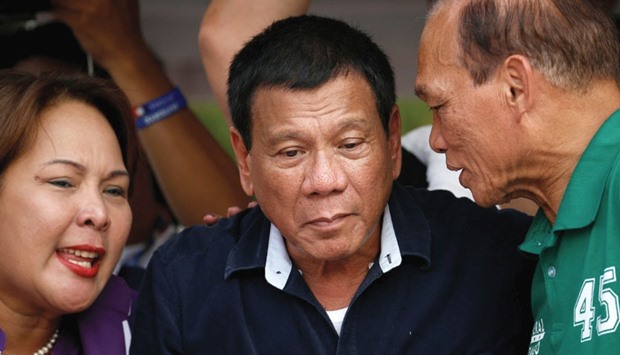
Presidential candidate Duterte with senatorial candidates Dionisio Santiago and Sandra Cam.
Anti-establishment Philippine politician Rodrigo Duterte’s rollicking ride to presidential favouritism has triggered warnings of a coup should he win next week’s election, with opponents branding him a dictator in the making.
The Philippines has endured a tumultuous democracy since millions of people took to the streets to overthrow dictator Ferdinand Marcos in 1986, with a succession of leaders having to quell military unrest and one president ousted in another uprising.
Duterte is enjoying a double-digit lead over his rivals ahead of Monday’s presidential election, but he has created enemies with vows to embrace communist rebels and threats to abolish Congress or create a revolutionary government that could rewrite the constitution.
“The moment he tries to declare a revolutionary government, that is also going to be the day he will be removed from office,” senator Antonio Trillanes, a former navy officer famous for leading failed military uprisings in 2003 and 2007, told AFP on Wednesday.
“This guy has no respect for democratic institutions.”
Trillanes said some in the military were “strongly averse” to Duterte’s long-standing ties with communists, and that the reaction “could be violent.”
Communists in the Philippines are waging one of Asia’s longest-running insurgencies, with tens of thousands killed since the rebellion began in 1969. Dozens still die each year as the communists retain support among the poor.
Duterte has ruled the major southern city of Davao, which was one of the communist hotspots, as mayor for most of the past two decades, ending violence there by forging close ties with the rebels.
He has vowed to offer communist leaders posts in his government.
He has also raised deep fears about the rule of law under his presidency, promising to kill tens of thousands of criminals and pardon himself for mass murder.
On some occasions while campaigning Duterte has boasted about wanting to set up a dictatorship, and praised Marcos, but other times said the opposite.
President Benigno Aquino, who is limited by the constitution to a single term of six years, has spoken out repeatedly in recent weeks about his concerns that Duterte could turn into a dictator.
“Now that we are free, people who act like dictators are the ones in the lead,” Aquino said on Wednesday, as he warned the gains of democracy were in jeopardy.
Senator Grace Poe, tied in second place with administration candidate Mar Roxas about 10 percentage points behind Duterte, yesterday joined the growing chorus.
“His own words are a preview of what will happen to our country. If you visit a dictatorship like North Korea, everything looks well. But many are hungry and too terrified to complain,” Poe told reporters.
Ashley Acedillo, another coup plotter-turned-lawmaker, told AFP that a “military intervention” was likely under a Duterte presidency.
“The armed forces will stand true to its constitutional duty to protect the people and the state,” he said.
The ex-coup plotter’s warnings are not bluster, according to Manila-based security analyst Rommel Banlaoi.
“We will face a Duterte government that is very unstable,” Banlaoi told AFP.
Duterte has gained support across all sectors of society by fashioning himself as an anti-establishment politician who can achieve quick fixes to deep-rooted problems, such as crime and poverty, according to analysts.
He has promised to end crime within six months of his presidency by ordering security forces to go on a killing spree, as well as increasing the salaries of soldiers and troops.
He has been accused of running vigilante squads in Davao that have killed more than 1,000 suspected criminals. At times he has boasted about his involvement but on other occasions denied any links to the death squads.
Yesterday, Duterte gained the endorsement of the influential Iglesia ni Cristo (Church of Christ), a conservative Christian group believed to have more than a million voters that are required by their leader to vote as a bloc.
The Iglesia Ni Cristo (INC), or Church of Christ, also endorsed the only son and namesake of late dictator Ferdinand Marcos for vice president.
The names of the candidates being endorsed by the group were contained in sample ballots being distributed to members.
INC members “will vote as one in unity with the church administration and with God whose teachings the church strictly follows”, said INC spokesman Edwil Zabala.
The group has a voting strength of an estimated 1.7mn, according to survey firm Social Weather Stations.
According to the latest major opinion poll, Duterte was in the lead in the presidential race with 33% of the vote, ahead of administration candidate Mar Roxas and first-time senator Grace Poe.
Duterte, the tough-talking mayor of the southern city of Davao, has kept his lead despite criticisms over a joke about a gang rape of an Australian missionary in 1989 and allegations of ill-gotten wealth.
Analysts said the INC’s endorsement would definitely be an “addition” to the standing of Duterte and Marcos, but should not discourage their rivals.
“Everyone needs to work harder,” said professor Edna Co. “This is not yet the time to shrink and melt.”
More than 80% of the Philippines’ estimated 100mn people are Roman Catholic.
The Roman Catholic Church does not endorse candidates, and merely urges devotees to chose wisely and gives guidelines on traits that voters should look for in a government official.
